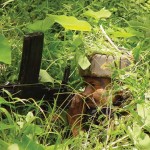We had a few desertions in the Island.
One fine morning, the boy and the militant jumped the cell and disappeared. Months later, when some of the Indian fishermen apprehended by the Sri Lankan Navy and handed over to us at Karainagar, were being sent back to Madras in our passenger ship from Kankesanthurai, one of the JCOs going on leave in the same ship recognised this jawan. He was apprehended and questioned. He confessed that he was enticed by the LTTE prisoner with tall, tempting promises and deserted.
Realising the gravity of the crime he decided to get back to Tamil Nadu in one of the fishing boats, but was apprehended by the Sri Lankans, who handed him over to us after keeping him for a month, thinking that he was an Indian fisherman. We kept him and other such fishermen in a small building near one of our posts till our Government finished formalities and the Tamil Nadu Police indicated a date for taking them over. We carried out no specific identification parade of these fishermen since it lay outside our jurisdiction. The deserter was happy to hide his identity as long as he could. He was later tried in accordance with the Army Act.
There were a few attempts to commit suicide and inflict self” injury. There were a couple of attempted murders too. Most of them related to unhappy circumstances at home: marital, parental, financial and so on. Frayed temper was another detonator, but the cause was high tension and anxiety. These were, all said and done, minor in scale, a natural fallout of war. By and large our officers and jawans displayed noticeable robustness and good discipline. Where it did not come up to the same high standard was in matters of money, although it related mostly to personal purchases and spending.
| Editor’s Pick |
Some individuals indulged in silly attempts of bringing lung is, cycle tubes and the like from India and selling them in Sri Lanka. On a larger scale were the attempts to smuggle goods -mostly electronic – from Sri Lanka to India. We-requested the Customs to establish their detachments at the airfield and port at Madras to check smuggling and give customs clearance to our jawans. That reined in much of this unlawful traffic. But then that also gave scope to certain rackets where various agencies at the checking point(s), including the Army’s colluded and struck varying bargains, blackmailed and deceived the jawans returning from Sri Lanka.
In Sri Lanka our Government had allowed a percentage of our pay to be drawn in Sri Lankan currency. These accumulations enabled the jawans to buy goods but they would be charged custom duty on return to India. We-requested the Government to give the IPKF soldier concessions in this tegard, since he was being paid in Sri Lankan currency. Finally, we requested the Government to treat us as Indian citizens and apply baggage rules to us.
That required passports, said the Customs. We asked the Government to give us those many thousands of passports. There was some softening. We were brought under the baggage rules as Indian citizens, at long last, towards the later half of’1989. It took us nearly two years to get this resolved so that we could be fair to the officers and men in regard to discipline, smarting under that odious allegation – ‘smuggling’.
Morale remained adequately high. In counter insurgency, there are no spectacular successes; but even the loss of a couple of soldiers and weapons in an ambush can have a telling effect on men. Consequently, small catches and weapon counts start appearing as big achievements. Operating in such an environment is laborious, trying, nagging, gnawing. Twenty days of alert, efficient patrolling can be cancelled out overnight by an ambush the next day.
Madras had a certain disdain for and gave an uncomfortable feellng of the IPKF soldiers.
Morale manifests itself in two states: defensive and offensive. Security of posts, not being ambushed, successful road and convoy protection, keeping the area of responsibility free of militant Incidents, may reflect defensive morale. But it may not reflect a state of high morale where soldiers ‘go’ for the militant, searching for him In the jungle, In his hide-out, In his lair, seeking him, getting at his throat by guile, initiative, manoeuvre and will to seek and destroy. This may be termed offensive morale. In our case, the state of offensive morale was not as high as the state of defensive morale. This is exemplified in losing contact with militants, lacking vlgour in pursuit, lifting cordons or releasing pressure prematurely, reluctance to penetrate the jungle boldly, opening fire at long ranges and tardiness towards bold experimentation.
The other aspect of morale as we noticed was that it operated at two levels, Internal and external. Internally, the intrinsic regimental traditions, spirit and pride held firm. Where these were yet to take firm root, as in some recently raised units, the officer leadership provided the prop and the fibre. Where both these were suspect or sub-standard there was trouble; low morale.
In one case a battalion failed to contribute, even to move and became an useless mass.~ another case a battalion disintegrated, leaving their dead and wounded and trudged back In driblets over the next two or three days. By and large, in fact, In most units, morale remained fairly high because of the Internal functional structure, the regimental system and leadership. Externally, it suffered at the hands of such Influences as the politics of people like Gopalaswamy, Nedumaran and others; the attitude of the Tamil Nadu Government’ towards the IPKF vis-a-vis the LTTE which was pointedly lionlsed and towards the IPKF’s Intelligence reports on the LTTE’s presence and activities in Tamil Nadu which were largely Ignored; and the pronouncements of eminent people like Justice Krishna Iyer, AP Venkateshwaran and others on IPKF operations in Sri Lanka.





Very clear and incisive analysis. Hope something good came of this.